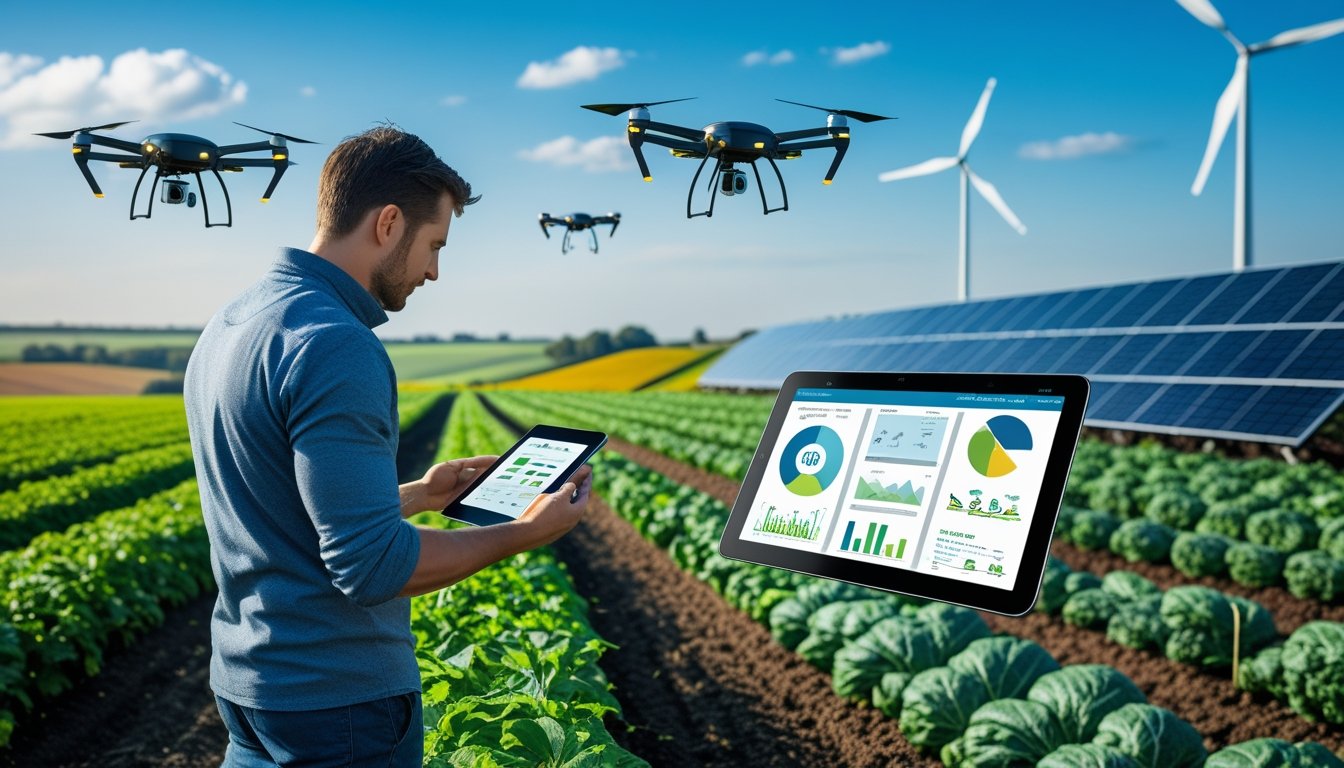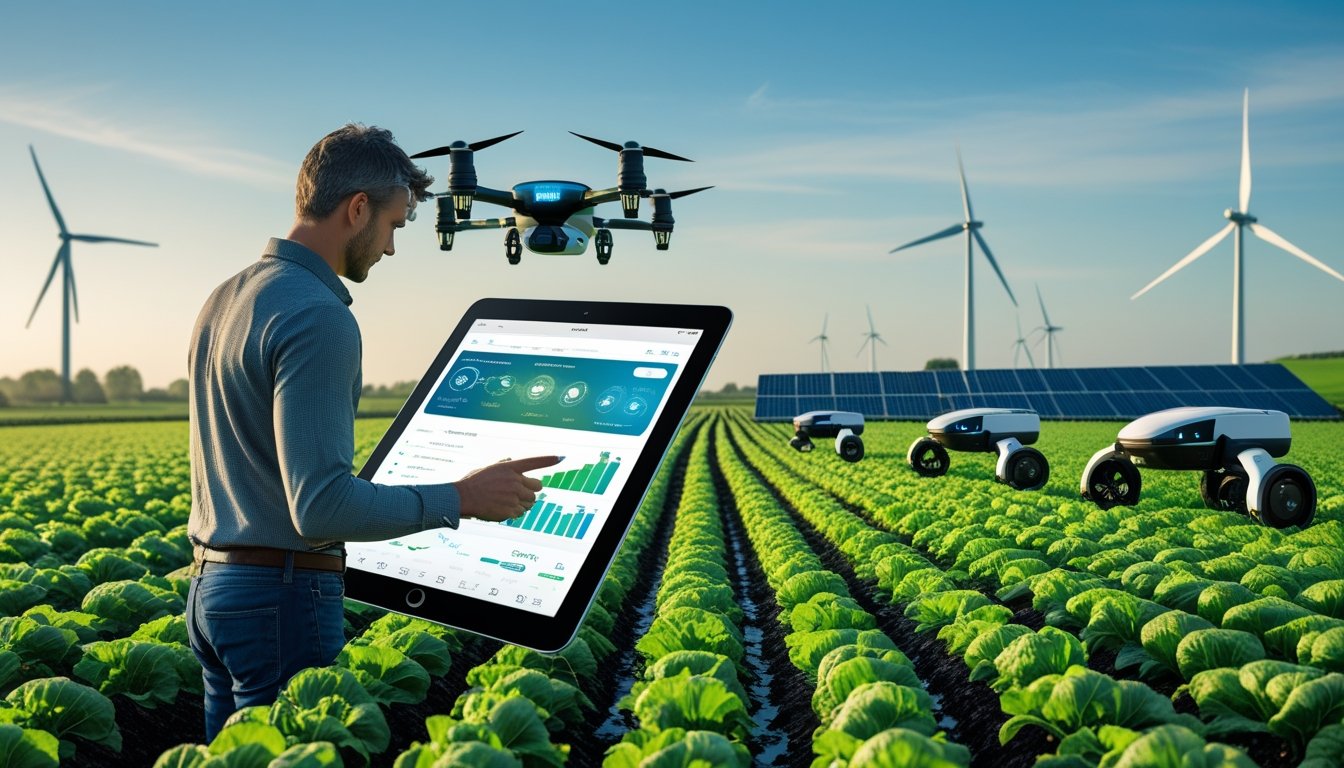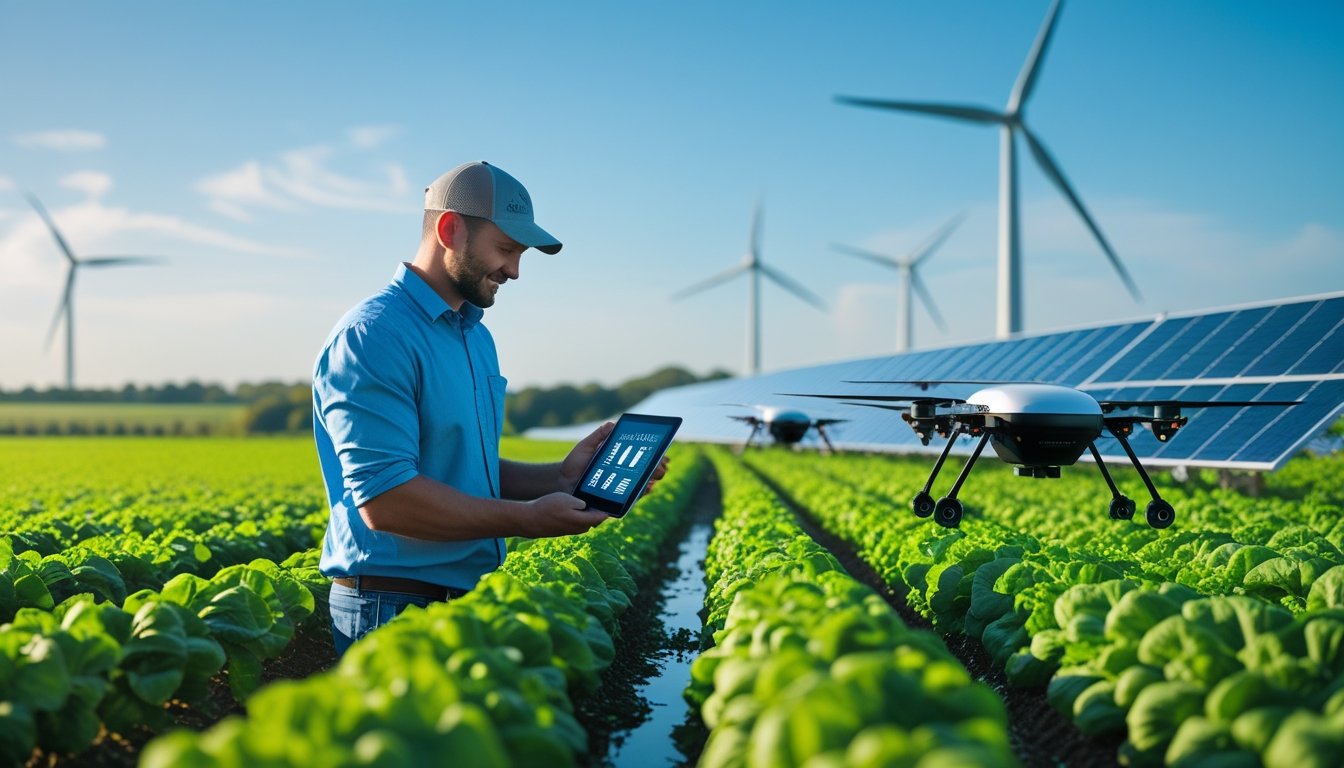Late updated: 02 Jul 2025 11:07
Written by: Oliver Bennett
AI Innovation In Sustainable UK Farming Practices: Advancing Eco-Friendly Agriculture
In the heart of British agriculture, AI innovations are breathing new life into how we approach farming. This isn't just about adopting new technologies; it's a shift towards greater sustainability and efficiency in our agricultural practices. AI is transforming traditional methods, allowing us to embrace precision farming techniques that significantly reduce waste and improve yield.

As we explore these technological breakthroughs, it's clear that they address critical challenges faced by the sector. Predictive algorithms and digital twins are examples of how farmers can monitor and simulate environmental conditions, enabling them to make informed decisions. This enhanced decision-making process directly contributes to environmental sustainability and strengthens food security.
Our journey with AI in agriculture signifies a promising future where farming meets technology, making it both innovative and sustainable. These advancements offer new opportunities for farmers to not only adapt to change but also lead the charge in sustainable practices.
Key Takeaways
- AI innovations boost precision and efficiency in UK farming.
- Enhanced decision-making supports sustainability and food security.
- Technological adoption helps farmers adapt and thrive.
AI-Driven Innovations in Sustainable UK Farming Practices
Artificial intelligence is transforming UK agriculture by enhancing sustainability and productivity. From improving crop yield predictions to automating farming tasks, AI-driven technologies are integral to modern agricultural strategies. We explore key innovations that promise to shape the future of farming.
Artificial Intelligence Transforming the British Agricultural Landscape
The adoption of AI in British farming marks significant strides towards sustainability and efficiency. AI technologies provide tools for precise monitoring and data analysis, enabling farmers to make better-informed decisions. By streamlining operations and optimising resource use, AI helps manage challenges such as climate change and resource scarcity.
AI systems enhance sustainable practices by increasing productivity without depleting natural resources. Through advanced analytics, AI improves soil health monitoring and nutrient management, ultimately promoting environmental conservation while supporting agricultural needs. These innovations position the UK as a leader in smart agriculture.
Precision Farming: Sensors, Drones, and Real-Time Data
Precision farming integrates sensors, drones, and real-time data analytics to boost productivity and resource management. Drones equipped with sensors capture high-resolution images of fields, providing vital data on crop health and soil conditions. This data guides farmers in applying water, fertilisers, and pesticides judiciously.
Real-time data empowers farmers to assess crop conditions quickly, allowing immediate interventions when necessary. Employing such technologies reduces waste and inputs while maintaining high yields. Precision farming thus fosters cost-effective and environmentally friendly farming methods, enhancing the sustainability of UK agriculture.
Machine Learning for Crop Yield Prediction and Pest Management
Machine learning algorithms play a crucial role in predicting crop yields and managing pests. By analysing historical data, these algorithms forecast potential outputs and identify risks, such as pest infestations or diseases, before they occur. Early prediction allows for timely action.
In pest management, machine learning identifies patterns and predicts outbreaks, helping in devising strategies to combat threats without excessive pesticide use. This ensures healthier crops and preserves the ecosystem. Embracing predictive analytics ensures efficient farming practices and bolsters agricultural productivity.
Automation and Robotics for Enhanced Productivity
Automation and robotics are revolutionising farming by handling labour-intensive tasks more efficiently. Autonomous tractors and robotic milking machines reduce human labour demands and enable precise operations. This mechanisation leads to increased efficiency and reduced turnover time.
Agricultural robots perform tasks like planting, weeding, and harvesting, enhancing productivity and reducing labour costs. These robots minimise human error and ensure uniformity in farm activities. Automation contributes significantly to sustainable practices by maximising efficiency and reducing waste, driving innovations in UK agriculture forward.
Impact of AI Innovation on Environmental Sustainability and Food Security

AI technology is transforming sustainable farming practices by addressing environmental concerns and enhancing food security. Its role in resource management, reducing environmental impacts, and supporting agricultural productivity is significant in adapting to modern challenges.
Resource Management: Water Levels, Soil Health, and Biodiversity
AI helps optimise resource management by providing precise data on water use and soil conditions. This precision is essential in a country like the UK, where unpredictable weather can affect water availability.
AI-driven systems can forecast water needs, reducing wastage and combating water scarcity. With AI, farmers can analyse soil health more accurately. Monitoring nutrients and soil composition ensures healthier crops and improves land use.
Biodiversity is another critical aspect. By analysing data patterns, AI encourages practices that protect wildlife and promote ecosystem balance. This integration of AI in monitoring enhances environmental sustainability in agriculture.
Reducing Environmental Impact and Carbon Emissions
AI tools enable the reduction of carbon emissions in farming by enhancing efficiency. Smart sensors and drones deliver real-time data, allowing farmers to make informed decisions about fertiliser and pesticide use.
These technologies help in precision farming, targeting only specific areas and reducing excessive chemical use. This approach limits pollution and conserves energy, aligning farming practices with environmental sustainability goals.
Additionally, optimising logistics and supply chain management through AI results in reduced fuel consumption. AI's role in streamlining operations plays a pivotal part in reducing agriculture's carbon footprint, contributing to improved environmental outcomes.
Enhancing Food Security and Sustainable Agriculture
With AI, we can expect improvements in crop yields and productivity, crucial for strengthening food security. Machine learning algorithms analyse climate patterns and crop performance, helping farmers adapt to changing conditions.
This predictive capability supports resilience to climate change, improving the stability of the food supply. AI also fosters sustainable agriculture by encouraging practices that increase productivity without depleting resources.
This includes enhancing fertiliser use and pest control, ultimately leading to a more secure, sustainable farming landscape. By adopting AI, we ensure that future agricultural practices meet the growing demands of the population while respecting environmental limits.
Frequently Asked Questions

AI is revolutionising farming practices across the United Kingdom, creating more sustainable and eco-friendly agricultural systems. Let's explore how precision agriculture, environmental enhancements, livestock welfare, carbon management, and smart equipment integration are shaping the future of UK farming.
How is artificial intelligence enhancing precision agriculture in the United Kingdom?
Artificial intelligence enables precise data collection and analysis, significantly improving yield predictions and resource efficiency. AI tools help farmers monitor soil conditions, predict weather patterns, and optimise planting strategies.
What are the environmental benefits of implementing AI in crop and soil management?
AI contributes to better crop management by minimising wastage of water, fertilisers, and pesticides. By improving resource efficiency, we can reduce environmental impact and enhance soil health. AI systems also support biodiversity by tracking endangered species and promoting eco-friendly practices.
In what ways can machine learning contribute to livestock welfare and productivity?
Machine learning algorithms analyse data on animal health and behaviour, allowing farmers to detect illnesses early and manage livestock more effectively. By optimising feeding and breeding practices, machine learning can boost productivity and welfare in livestock farming.
What role does AI have in managing and reducing the carbon footprint of UK farms?
AI assists in carbon footprint management by optimising energy use and improving equipment efficiency. By analysing greenhouse gas emissions, AI technologies provide actionable insights to help reduce emissions and meet environmental targets.
How are UK farmers integrating smart farm equipment into their practices to improve sustainability?
Smart farm equipment, such as AI-powered drones and sensors, is being integrated to monitor crop growth, optimise irrigation, and automate harvesting. These advancements lead to increased efficiency and lower resource consumption, supporting sustainable farming practices.
What challenges do UK farmers face when adopting AI technologies for sustainable farming?
Adopting AI technologies comes with challenges such as high initial costs and training requirements. Farmers may encounter technical difficulties and require support systems to integrate and maintain AI tools effectively in their operations.
